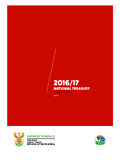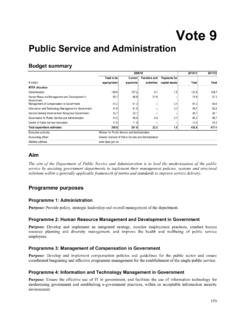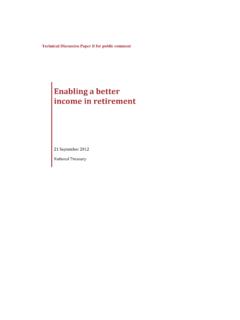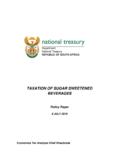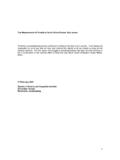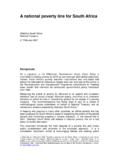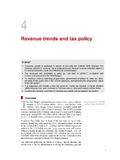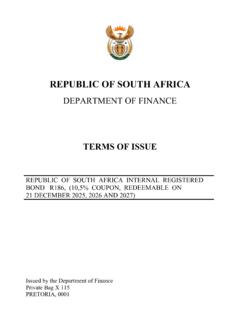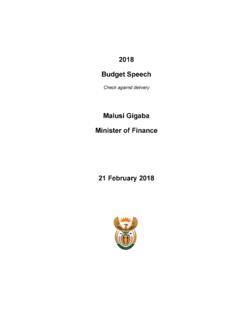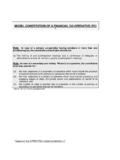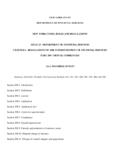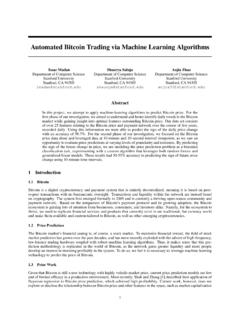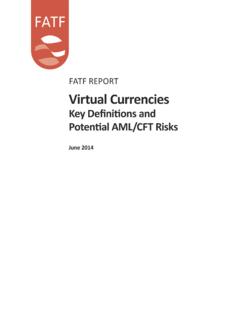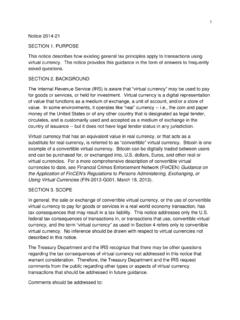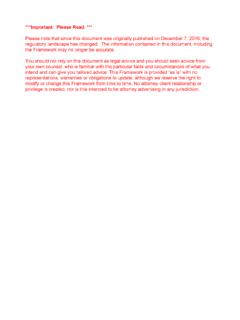Transcription of USER ALERT Monitoring of virtual currencies
1 USER ALERT Monitoring of virtual currencies The National Treasury, the South African Reserve Bank, the Financial Services Board, the South African Revenue Service and the Financial Intelligence Centre, would like to warn members of the public to be aware of the risks associated with the use of virtual currencies for either transactions or investments. virtual currencies are becoming increasingly popular among users to purchase goods and services, to transfer to another person, for personal use or to hold as an investment. While there are benefits associated with this new technology, it is difficult to assess those benefits against the risks of something so novel, innovative and technologically sophisticated.
2 Users of virtual currencies can therefore become susceptible to fraudulent or any other criminal behaviour as they may be less circumspect than usual when faced with the promise of high-return investment opportunities. Accordingly, we strongly advise users to consider the concomitant risks when evaluating undertakings involving virtual currencies . The relevant authorities will continue to monitor and assess the use of virtual currencies and consult with private sector stakeholders in this regard. Further guidance or regulations may be issued, should the need arise. What are virtual currencies and how do they work?
3 A virtual currency is a unit of account that is digitally or electronically created and stored. Members of the virtual community agree to accept these units as a representation of value in the same way that currency is accepted. In contrast to traditional currencies , virtual currencies operate without the authority of central banks, and are therefore not regulated. An example of a virtual currency is bitcoin , which has become popular and widely used; however, there are several examples, including bitcoin , Darkcoin, Peercoin and Feathercoin. A virtual currency such as bitcoin allows users to purchase goods and services without using a government-backed currency so long as participants are willing to accept Bitcoins as a form of payment.
4 bitcoin is software based and uses peer-to-peer technology to operate without the involvement of the central bank or commercial banks. It is therefore decentralised, where the managing of transactions and the issuing of Bitcoins are done collectively by the network. Furthermore, bitcoin is open source , meaning that its design is public; nobody owns or controls it and there are no barriers preventing people from using it. Participants can conduct instant peer-to-peer transactions and also make worldwide payments using Bitcoins. Bitcoins can be exchanged or purchased with real currency (for example, ZAR, US Dollar and Euro), and Bitcoins purchased are deposited in a digital wallet.
5 Bitcoins can also be converted back to real currency as and when required, provided there is a willing buyer. Unregulated in South Africa Currently in South Africa there are no specific laws or regulations that address the use of virtual currencies . Consequently, no legal protection or recourse is afforded to users of virtual currencies . Due to their unregulated status, virtual currencies cannot be classified as legal tender as any merchant may refuse them as a payment instrument without being in breach of the law. In addition, virtual currencies cannot be regarded as a means of payment as they are not issued on receipt of funds.
6 The use of virtual currencies therefore depends on the other participant s willingness to accept them. While virtual currencies can be bought and sold on various platforms, they are not defined as securities in terms of the Financial Markets Act, 2012 (Act No. 19 of 2012). The regulatory standards that apply to the trading of securities therefore do not apply to virtual currencies . Risks and challenges users should be aware of: There is no investor protection and no recourse Because virtual currencies are not regulated, users are not protected and are at the risk of losing money. Transactions are also irreversible.
7 The price of virtual currencies is based on investor sentiment and can rise rapidly, thus attracting investors looking for very high returns from investments. However, the prices of virtual currencies tend to be very volatile and can drop as quickly as they rise. This may encourage speculative behaviour, which in turn spurs more volatility. Financial risks are, therefore, limitless and claims cannot be made for such losses. virtual platforms are prone to operational risks In the virtual environment operational errors can occur which may be difficult to resolve. Cyber-attacks resulting in the theft of virtual currencies are becoming increasingly common.
8 Digital wallets can be hacked, and the virtual currencies stolen, since they are stored on electronic devices or platforms, which can also be susceptible to damage or disruption. In such cases, there are no prospects of the retrieval or recovery of the virtual currency or the restoration of the hacked electronic device. There is no cancellation or reversal of the transaction once the virtual currency has been transferred. virtual currencies are susceptible to misuse virtual currencies are particularly susceptible to misuse as transactions are difficult to trace and provide users with a high degree of anonymity, contributing to their attractiveness to criminals, fraudsters and money launderers.
9 This also makes it easier for virtual currencies to be used for purposes of manipulation, money laundering, financing of terrorism and other illegal activities. Recommendations In order to be fully aware of and understand the risks associated with virtual currencies , we recommended that users conduct thorough research about investment offers or means of payments involving any virtual currency before committing to any such transactions. Users should weigh up the concomitant benefits and risks associated with virtual currencies . Enquiries should also be made about the governance, financials and/or registration details of anyone providing the investment proposals through this virtual channel and should they have any concern these can be reported to the email address below.
10 Users should also assess how the virtual currency platforms operate before participating in such transactions. We advise users to exercise extreme caution when participating in virtual currency transactions. Dealing in virtual currencies is performed at the user s own risk with no recourse to South African authorities. Questions or comments can be emailed to Issued by: National Treasury Date: 18 September 2014
